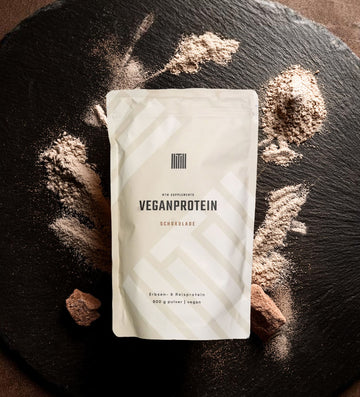Vegan protein or whey protein – what do you need to pay attention to?
Protein is an essential building block for our bodies. It supports muscle growth, promotes recovery, and provides a long-lasting feeling of satiety. When choosing the right protein, two main options are important: vegan protein and whey protein. In this article, you'll learn what makes both proteins special, what benefits they offer, and what to look for when choosing—so you can make an informed decision.
What is vegan protein?
Vegan protein is obtained from plant sources such as peas, rice, hemp, soy, or pumpkin seeds. These protein sources offer a good alternative for those who want or need to avoid animal products. Protein powders made from rice and pea protein are considered particularly good. Modern manufacturing processes isolate the individual protein components and process them into powders or bars that are ideal for incorporating into smoothies or shakes. In addition to their high protein content, these products often also contain valuable fiber, vitamins, and minerals.
The purely plant-based origin of a vegan protein not only addresses ethical and ecological aspects, but also ensures good tolerability – especially for people with lactose intolerance or allergies to animal proteins. Furthermore, the variety of plant-based protein sources allows for a varied combination that can be tailored to individual needs.
Benefits of vegan protein
The benefits of vegan protein are obvious. Due to its natural origin, it contains no animal byproducts, thus protecting not only the body but also the environment. Here are some of the most important advantages:
High tolerability
Thanks to the absence of lactose and cholesterol, it is particularly suitable for sensitive people.
Nutrient diversity
In addition to proteins, it often also provides fiber, vitamins and minerals.
sustainability
The cultivation of plant raw materials is generally more environmentally friendly than animal husbandry.
flexibility
It is ideal for vegan diets and can be used in a variety of ways in the kitchen.
These properties make vegan protein an attractive option for people who value a conscious diet and sustainable lifestyle.
What is whey protein?
Whey protein is obtained as a byproduct of cheese production. It is a milk protein and one of the most popular nutritional supplements in the sports sector. Due to its high quality, i.e., its excellent composition of amino acids, whey protein is absorbed particularly quickly by the body.
Modern production processes ensure that whey protein is offered in the purest form possible – often as a concentrate, isolate, or hydrolysate. The individual variants differ in their protein content and rate of absorption. Whey protein also has a neutral to slightly sweet taste and can be easily incorporated into shakes or smoothies, making it a favorite among athletes and health-conscious individuals.
Benefits of Whey Protein
The numerous benefits of whey protein make it an essential ingredient for many fitness enthusiasts. Users benefit from the following features, among others:
Fast absorption
The rapid absorption helps to supply the muscles with the necessary amino acids immediately after training.
Biological value
Thanks to the optimal composition of amino acids, Whey protein effectively promotes muscle building and regeneration.
versatility
It is available in various forms so that everyone can find the right variant for them – whether as a concentrate, isolate or hydrolysate.
Support for weight loss
Due to its high protein content and satiating effect, whey protein can help prevent cravings and control calorie intake.
These benefits make whey protein particularly attractive for athletes and anyone who wants to increase their performance while optimizing their body composition.
Differences between vegan protein and whey protein
Although vegan protein and whey protein both provide valuable protein, there are key differences you should consider when making your decision. The most important difference lies in their origin: Vegan protein comes from plant sources, while whey protein is an animal byproduct. This affects not only digestibility but also the nutrient mix and environmental impact.
Another difference concerns bioavailability. Whey protein scores with particularly rapid absorption and a high biological value, making it a favorite after intense workouts. Vegan protein, on the other hand, often offers a wider range of secondary nutrients that contribute to overall health and is particularly suitable for people looking for a lactose-free or more sustainable alternative.
Taste also plays a role: While whey protein generally has a creamy taste, the taste of vegan protein varies depending on the plant-based source and can range from earthy to slightly nutty.
Which protein is right for you ?
Choosing between vegan protein and whey protein depends on your individual needs and goals. If you value a sustainable, lactose-free diet and want to avoid animal products, vegan protein is an excellent choice. Its high bioavailability also often makes it the number one choice. In addition to high-quality protein, it also provides additional nutrients and is environmentally friendly.
If, on the other hand, you are looking for fast regeneration and optimal muscle building after training, Whey protein offers clear advantages. Its high biological value and rapid absorption make it an ideal companion for everyday exercise.
Both proteins can play to their strengths depending on the application and personal taste. Combining or alternating between them is a sensible option for many, allowing them to benefit from both worlds.
If you are still looking for a vegan protein, we have the perfect solution for you:
Conclusion
Ultimately, there's no clear winner when comparing vegan protein and whey protein. Both offer unique benefits and can optimally support your diet, depending on your individual needs and life goals. Be sure to consider the quality of the product, the origin of the raw materials, and your personal tolerance. By making the right choice, you can supplement your diet in a targeted manner and thus sustainably promote your health and performance.
Sources:
-
Joy, JM, Lowery, RP, Wilson, JM, Purpura, M., & De Souza, EO (2013).
The effects of 8 weeks of whey or rice protein supplementation on body composition and exercise performance. Nutrition Journal, 12(1), 86. https://doi.org/10.1186/1475-2891-12-86 -
van Vliet, S., Burd, NA, & van Loon, LJC (2015).
The skeletal muscle anabolic response to plant- versus animal-based protein consumption. The Journal of Nutrition, 145(9), 1981-1991. https://doi.org/10.3945/jn.114.204305 -
Messina, M. (2010).
Insights gained from 20 years of soy research. The Journal of Nutrition, 140(12), 2289S-2295S. https://doi.org/10.3945/jn.110.124107 -
Katz, DL, & Meller, S. (2014).
Can we say what diet is best for health? Annual Review of Public Health, 35, 83–103. https://doi.org/10.1146/annurev-publhealth-032013-182351




